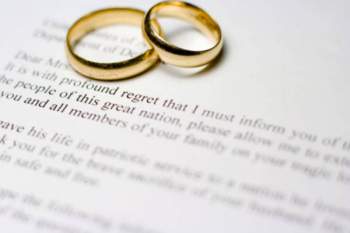
Read to Understand Common Law Marriage

Popular In Marriage
Common Law Marriage Louisiana Common Law Marriage Massachusetts Common Law Marriage Nevada Common Law Marriage Ohio Marriage Certificate Common Law Marriage Kentucky Free Marriage Records Putative Marriage Definition Common Law Marriage Alaska Common Law Marriage Oklahoma Common Law Marriage Mississippi Common Law Marriage New Mexico
Background:
Common law marriage predates marriage granted through the use of a marriage license. In fact, the only difference in principle between marriage and common law marriage is the use of a marriage license. Common law marriage is granted only when couples meet stringent requirements prescribed by their state of residence. Those requirements vary in states that legally recognize common law marriages. Generally, the requirements are fairly standard, but couples must be sure that they meet their state's requirements to avoid difficulties later.
In states that grant common law marriages, requirements are generally similar to the requirements for obtaining a marriage license, while removing the necessity of a marriage ceremony. However, once the marriage has been granted, there can be many other differences between the two types of marriage. For example, couples in common law marriages may not have access to all of the rights and responsibilities conferred upon marriages. In some states, couples may not even be legally allowed to be granted a common law marriage. In states that do allow common law marriage, the rights associated with that relationship will also vary. Some states view common law marriage in the same way that they view marriage. However, some states offer only limited rights and responsibilities to common law marriage.
Idea of Common Law:
Common law marriage is often used by individuals who are opposed to government control of relationships. With the requirement of a marriage license for most marriages came more government control over which couples were granted the right to marry. Originally, only white couples were allowed to obtain a marriage license in the United States; interracial couples were forbidden from getting marriage licenses. Currently, most same sex couples in the United States are forbidden from obtaining a marriage license. In this way, the government controls which couples are allowed to obtain a legal recognition of their marriage. However, many religions History:
Recognition of common law marriage continues to vary state by state. In fact, there are few countries that offer a legal recognition of common law marriages. While some states currently offer legal recognition to marriage achieved through common law, others do not. Marriage laws across the country continue to evolve. In fact, there are states that only recognize common law marriages that were granted before a certain date. The political climate in the united States has a large influence over each state's marriage laws.
The same sex marriage debate has had a great influence over the conferment of relationship rights for all couples. In liberal states, couples do not necessarily have to take part in a legal marriage ceremony in order to obtain relationship rights. Yet, some states continue to outlaw any legal alternative to marriage. Laws are likely to change and eventually, those laws may apply across the country. For many, the right to marry is a civil right granted to each citizen. However, each state has the capacity to allow couples to marry, according to individualized ideals prescribed by lawmakers. Generally, those ideals are matched by the political and religious climate of each region.
The purpose of common law marriage, is to allow couples to obtain relationship rights in the absence of a marriage license. Certain states allow the conferment of the rights and responsibilities State
Variations:
Most states offer no legal recognition of common law marriages. However, some states offer common law married couples the same rights and responsibilities as couples that were married as a result of obtaining a legally valid marriage license. In New Hampshire, couples are granted only inheritance rights through common law marriages. While that is an important relationship right, many other important rights are withheld from common law marriages in that state. For example, individuals in common law marriages in that state may be unable to visit their spouses in the hospital or take part in any health care decisions that relate to their spouses. In addition, couples are unlikely to be able to take part in a family health benefit plan or other discounted offers meant exclusively for married couples.
However, other states grant all rights and responsibilities of marriage to common law marriages. Those rights include owning shared property and joint bank accounts. In addition, couples granted a common law marriage in one state are likely to have that marriage recognized in other states. In order to be granted a common law marriage in states that allow it, couples generally have to meet certain requirements. These requirements often include requirements that couples must live together for a certain period of time, hold themselves out as husband and wife, and be legally able to consent to the marriage. No state grants a common law marriage based solely on the amount of time a couple has lived together. In most states, couples that were granted a common law marriage must seek a legal dissolution of their relationship in order to enter any other legally binding relationship contract.
There are many similarities between common law marriages and marriages granted through a marriage license. However, there are important differences as well. In states that grant only limited rights to common law marriages, there are significant differences between the two. For example, certain states grant only inheritance or estate planning rights to common law marriages. In that case, couples that choose to separate have no legal recourse for shared marital property, spousal support, or other determinations granted through divorce.
In addition, that couple would have no rights to take part in any health care decision on behalf of their spouse. Spouses may be unable to visit each other in the hospital or in prison. In fact, spouses would be unable to obtain any information regarding a partners health care. In addition, couples that have been granted a common law marriage may find that their church does not recognize their relationship. In fact, churches are only likely to grant recognition to the relationship if the couple took part in a religious marriage ceremony, with or without a marriage license.
Income Tax:
Generally, regions that do not legally recognize common law marriage have specific reasons for particular marriage laws. For example, the United Kingdom does not recognize common law marriages because those couples have no legal or religious ceremony in order to be granted marriage rights. In that case, the government is asserting its right to limit couples' ability to marry. The same holds true in certain U.S. states and other parts of the world. Some regions that are religiously oriented forbid any legal recognition of marriage that took place in the absence of a religious ceremony. In other regions, couples cannot be granted a common law marriage due to restrictions and limitations put in place to ensure government control over the institution of marriage. In any case, common law marriages are rarely recognised as legal marriage contracts.



















